Disclaimer: Despite the “Guide” in the title, the following post is primarily a subjective look at the landscape of chess podcasting and, as such, shouldn’t be taken as any kind of “objective” review.
Table of Contents
Introduction: A Brief History of Chess Podcasting
Even though podcasting as a format has been around for several decades, if you took a look around the chess landscape just a couple of years ago (say in 2018 or 2019), you would quickly realize that chess podcasts were only a few and far between.
Sure, there were some – such as the most famous chess podcast out there, The Perpetual Chess Podcast and the Full English Breakfast Club, but if you tried to assemble a list of noteworthy chess podcasts around that time, it would be very challenging to reach the double-digit entry. 1
It is very safe to say that the market for Chess Podcasting has been very unsaturated for a very long time. However, in 2022, after the Great Netflix/Queen’s Gambit/Pandemic Chess Boom2 ignited unprecedented interest in our ancient game, chess activities proliferated in all shapes and forms – including the sphere of chess podcasting.
We have witnessed a tremendous explosion of chess podcasts in the last year or two. A number of club players, chess personalities, chess enthusiasts, adult improvers and even top players have launched their own chess podcast – and there seems to be no sign of stopping 3 Quite a few of these podcasts have also attracted the allure of the leading chess companies and receives sponsorships from either Chess.com or Chessable. 4
In any case, I don’t think there is anyone who would say that the chess podcast market is unsaturated nowadays. As a matter of fact, from the perspective of a chess podcast aficionado, the market might even be oversaturated. Given the sheer amount of chess podcasts available today and the fact that most of them release their episodes on a weekly basis 5 it is getting increasingly challenging 6 to listen to all of them on a regular basis.
This means one has to embark on something that just a couple of years ago seemed like science fiction – deciding to listen to just some chess podcasts and not to listen to the others.
Almost.
At.
All.
Alas, as much as having a lot of options is a good thing, the good old Paradox of Choice states that the more options you have, the more difficult it is to choose between them. Just like with the online courses, chess books, and other resources related to chess improvement – the abundance of options makes it a headache to decide which one of these options is for you. Especially if you are a relative newcomer to the chess scene.
Now, since I have been listening to the Chess Podcasts quite regularly for the last 4-5 years and since I am a perspective chess blogger who likes to shove his opinions on the Internet and use the „Ultimate Guide to“ in the article titles to generate clicks and increase the natural traffic from the SEO, I thought it might be a nice idea to write an article on this topic and talk about some of my own favorite podcasts I like to listen to.
My hope is that it will help you deal with the Paradox of Choice more successfully or at least get a better overview of the Chess Podcasting market and familiarize yourself with some of the podcasts available out there.
What Makes A Good Chess Podcast/Podcast Episode (for me)
Now, before we get to the actual list of chess podcasts I recommend/listen to regularly, I would like to take a moment to talk about what constitutes a good chess podcast. In this section of the article, I will mention a few criteria/categories I personally find extremely important when it comes to judging the quality/attraction of a chess podcast 7.
So, without further ado, some of the criteria that are highly important to me personally are:
Interviewing/Conversational Skills
First and foremost, since listening to a podcast basically tantamounts to listening to a conversation between two or more people, 8 for me personally the quality and the nature of that conversation is of paramount importance. In my experience, the best podcast episodes are the ones where the conversation simply „flows“ and where two or more people are engaged in a deep, honest, and enticing conversation.
Now, even though it may be a bit unfair to put all the responsibility on the shoulders of a single person in a format where several parties are involved, I do feel that the „flow“ of the conversation largely depends on the interviewing/conversational skills of the host of the given podcast. 9
I think that making your guest feel comfortable, asking the right, deep, meaningful – and sometimes uncomfortable – questions that solicit deep, meaningful responses, and balancing between listening to the guest and expressing your own attitude is extremely difficult. Especially if you are talking to a relative stranger who is not extremely talkative/expressive, to begin with – in a specific, 1-1 format that is supposed to last for an hour or so.
I feel that many people underestimate how difficult it is to be a good podcast 10 host. The job requires great listening and comprehension skills, good coherence when it comes to expressing yourself, and a high level of emotional intelligence/self-awareness.
I think it is not a coincidence that many successful host podcasts also seem like highly intelligent and very kind human beings one would absolutely love to grab a beer with and have a conversation even outside the podcast format.
Preparation
Of course, even though great conversational and interviewing skills are definitely important, one could argue that they are not sufficient in themselves – at least if we are talking about the podcasts that feature a different guest in every episode.
Just as good opening preparation is important when it comes to the outcome of a chess game 11, good preparation for a chess podcast is definitely very beneficial for the overall quality of the given episode, as it enables the host to ask more targeted and more meaningful questions. A listener can definitely tell when a podcast host has done their homework or when they are just winging it and it is not a coincidence that some renowned (chess) podcast hosts are well-known for their meticulous research before they click the „Record“ button.
Of course, this is not to say that it is impossible to record a good and entertaining podcast episode without doing research – especially if we are talking about a podcast with a standard set of hosts. But good preparation is definitely something I personally value and take into account.
Guest of the Podcast
Even though I do listen to a number of podcasts that have a constant hosting cast and that don’t feature any guests, I do also enjoy listening to podcasts that do have the more traditional format of a single host that then invites a different guest for every new episode.
For podcasts that are based on that format, the name and the surname of the guest being featured in a certain episode is definitely a factor I do take into account when considering whether to listen to an episode or not.
Of course, it is not an absolute determining factor. There are podcasts to which I listen almost irrespective of who the guest is. There are also situations where I do decide to listen to a podcast episode even if I don’t know who the guest is, purely out of curiosity.
But for podcasts where I don’t listen to every episode and in situations when my time is restricted, this is a factor I do take into account.
It is a little bit sad given that chess is full of amazing people and interesting personalities. But given the number of podcasts out there, one has to filter on the basis of some criteria – and the name and the surname of the guest are very obvious.
Humour
Anyone who has ever read this blog or seen some of my pitiful humour attempts available in the remote corners of the Internet should know that a good sense of humour is one of the traits I value in people – above anything else. Sure, I am all for having deep meaningful conversations and being serious, but isn’t it better if it can be infused with humour, laughter, irony, sarcasm, and a healthy dose of self-deprecating comments?
The humour aspect is extremely important to me in the context of a chess podcast. 12 Having a host/hosts who has a great sense of humour, who doesn’t take himself/herself seriously, and who has the ability to make me laugh aloud 13 makes the entire listening experience ten times more enjoyable and entertaining. Especially if the humour is combined with great conversational/interviewing skills, which is often the case since a certain degree of intelligence is required for both!
This is why, throughout this article, you will see me repeatedly emphasizing the humouristic aspect of a few podcasts and holding the whole category on a pedestal. I personally can’t constantly listen to a podcast if it doesn’t regularly make me laugh.
Theme/Topics of the podcast
Another very important criterion I take into consideration when forming an opinion of the podcast is the underlying theme of the podcast as it very often directs the topics that are prevalently covered in that very podcast.
For example, even though all chess podcasts nominally have chess as a central theme, many chess podcasts emphasize a different area of chess as their central theme and cover different topics related to that theme. Furthermore, even podcasts that are not specialized in a certain topic have a special series of episodes devoted to a certain topic.
The most common choice these days is chess improvement: quite a few podcasts such as The Chess Experience or Chess Journeys: Tales Of Adult Improvement are almost exclusively devoted to it, while Ben Johnson also regularly covers it on the Perpetual Chess Podcast in the popular Adult Improver Series.
Some other themes include chess books (once again spearheaded by Ben Johnson and his Book Improver Series), chess and psychology (Chess Feels Podcast), or top-level chess and current happenings in the chess world (The Chicken Chess Club Podcast).
Of course, it may be a bit unfair to label the podcasts in this manner, given that many chess podcasts can’t be labeled and that the conversation in every one of the aforementioned podcasts is usually much broader than would seem from the underlying theme.
But I nevertheless think it is a criterion worth considering as it may, at least superficially, indicate whether a certain podcast is more interesting for you than the other.
My Own Subjectivity
Last but not least, it goes without saying that the list of the criteria 14 is a highly subjective matter. The things that are important to me don’t necessarily have to be as important to you.
The same goes for anything else related to a certain podcast. My impression of the host, my interest in the topics that are covered, how much I resonate with the opinions shared in a certain podcast, or the overall philosophy that a certain podcast encompasses are all very subjective. And even though I tried to be as objective as possible in my review of a number of podcasts in this article, it is impossible to completely eliminate personal biases 15 when talking about a long audio form that is very prone to subjective impressions, to begin with.
Thus, even though I titled the article with the pretentious „Ultimate Guide“ phrase for catchiness/SEO purposes, please keep in mind the list I am about to present is first and foremost – based on my own preferences and subjective reasoning.
Even so – I do hope it can serve as an informative dive into the world of chess podcasting and as a good starting point for you, dear reader, to form your own subjective and personal opinions.
As mentioned previously, in the last few years we have seen a massive explosion in the niche of chess podcasting. Given the number of chess podcasts out there and my own time constraints, it is only natural that some podcasts appeal to me more than others.
Due to this fact, I have decided to divide the list of Best Chess Podcasts into three sub-categories:
- Chess Podcasts I Always Listen To
- Chess Podcasts I Regularly Listen To
- Chess Podcasts I Wish I Had Time To Listen To
I will try my best to explain why I decided to put a certain podcast in a certain sub-category and what makes me prefer certain podcasts over others.
Thus, without further ado, let’s talk about what I consider to be the best chess podcasts out there, starting with the Chess Podcasts I Always Listen To.
Chess Podcasts I Always Listen To
The Chicken Chess Club Podcast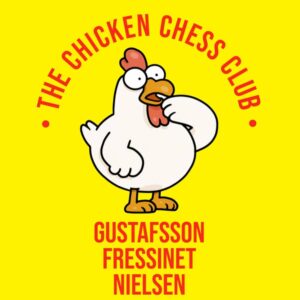
About the podcast
Chicken Chess Club Podcast is a relative newcomer on the scene of chess podcasting, with the first episode launched on 20th April 2022.
It is a weekly chess podcast hosted by three household names of the chess world – grandmasters Jan Gustafsson, Laurent Fressinet, and Peter Heine-Nielsen in which they catch up and discuss recent happenings in the world of chess, the world of chess politics, and – last but not least – their own personal lives.
My impressions of the podcast
When the first episode of the Chicken Chess Club Podcast was launched, I listened to it immediately and have been immediately hooked. I haven’t missed a single episode since. Chicken Chess Club is definitely my number 1 priority when that dreadful Tuesday with all the new Podcast episodes arrives.
There are several reasons why I find this podcast both fascinating and entertaining at the same time. All three hosts of the Chicken Chess Club are deeply immersed in the world of professional chess and are on the brink of information related to anything relevant happening.
GM Peter Heine Nielsen has been the main coach of the Viswanathan Anand’s Team in World Championship Matches in 2008, 2010, and 2012 and the main coach of the World Champion Magnus Carlsen since 2014. Laurent Fressinet and Jan Gustafsson were also members of Magnus Carlsen’s team for the 2018 and 2021 World Chess Championships, while the former has also worked with some well-known players, such as Vladimir Kramnik, in the past.
As far as I know, no other chess podcasts 16 are hosted by someone who has such a highly accomplished chess career and similar credentials. Virtually no other podcast provides the listener with such a unique dive into the world of professional chess and such a unique perspective about the historical moments, players, personalities, and events. The podcast is full of interesting titbits and entertaining stories from top-level tournaments, chess events, and chess training camps. Given that I am a big lover of chess history and chess world championship matches – I can simply never get enough of them!
To be honest, even if the hosts of the podcast were the biggest douchebags on the planet, I would probably still listen to it purely for the chess content. However, what makes the Chicken Chess Club podcast even more amazing are the personalities and characters of the three main protagonists – and their interpersonal dynamics!
One thing I learned about chess players in the last decade or so 17 is that they either have an atrocious or absolutely mesmerizing sense of humour. I honestly count some of the personalities from the chess world among the funniest, wittiest, and most hilarious people I ever had the opportunity to meet 18 – and Gustafsson, Fressinet, and Nielsen definitely fall into this category.
All three hosts of the podcast are extremely sarcastic and ironic individuals who have a great – albeit very dry – sense of humour and who don’t take themselves too seriously. 19 Literally every episode is filled with their illicit banter, mutual mockery, jokes, and sarcastic remarks that immediately put a smile on my face – irrespective of whether we are talking about Gustafsson mocking Heine Nielsen for his FIDE President campaign slogans, Fressinet for his „Frenchness“ or complaining about having to play chess, Fressinet, and Nielsen arguing who has a more accomplished chess career or trio determining which player is worthy of the prestigious „Chicken of the Week“ title.
To put it simply – due to the unique insight into the chess world and the extreme amounts of mutual mockery, sarcasm, irony, and dry humour, the podcast is incredibly instructive and entertaining to listen to. I wholeheartedly recommend it to everyone – especially to people who follow Mr. Dodgy on Twitter, given that he is the main producer of the show!
Notable episodes of the podcast
Since Chicken Chess Club Podcast doesn’t feature any guests, it is very hard to pinpoint notable episodes since the format of every episode is relatively similar. Still, if I had to single out one episode and recommend it to someone who hasn’t yet listened to this podcast, I would probably mention the Candidates Prediction Special where the trio made an in-depth analysis of each participant of the upcoming Candidates Tournament 2022.
It was quite fascinating to hear their expert opinion and analysis of the strengths and weaknesses of each participant, given that they know all these players personally to a certain extent – and also given they kinda work for their main competitor, World Champion Magnus Carlsen. It is also one of the episodes that is a bit more on the serious side and a bit less filled with cynical humour and mutual mockery – so it might appeal more to new listeners 20.
The Perpetual Chess Podcast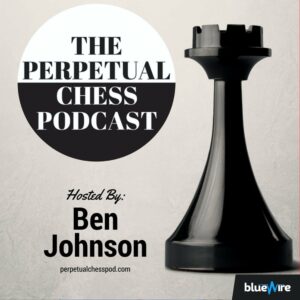
About the podcast
As already mentioned in the Introduction, The Perpetual Chess Podcasts is one of the oldest, most respected, and most notable Chess Podcasts out there. Hosted by the National Master Ben Johnson and founded in 2016, the podcast features guests from all spheres of the chess world – chess educators, content creators, authors, top players, and adult improvers.
Whether you want to listen to the most recent books, chess improvement tips, stories from chess folklore, chess history, or anything else chess related, the Perpetual Chess Podcast is a place for you. It is hard to imagine you will not find something that interests you in one of almost 300 episodes released up to this date. 21
My impressions of the podcast
I first heard about the Perpetual Chess Podcast somewhere in 2017/2018. As mentioned earlier, back in the day chess podcasting was still a big niche and there weren’t many options available. However many people in the chess circles talked about Ben Johnson’s podcast and it unanimously received very high praise, so it was only natural to give it a try. Almost immediately after I listened to the first episode I was immediately hooked and my love for the podcast has persisted ever since.
What makes Perpetual Chess Podcast so special for me? I believe it is a combination of two factors – Ben Johnson’s amazing personality, preparation, and „podcast hosting“ skills and his inclination to invite a very diverse variety of guests with different backgrounds, life stories, and relationships to our game.
Let’s start with the former. I think Ben Johnson is by far the best host of a chess podcast 22 out there due several reasons. First of all – given that he is a very accomplished chess player and a former chess teacher, he is very immersed in the chess world and very knowledgable about the past and current chess events, players and personalities.
By the sheer amount of references, name drops, and other conversational titbits in every episode it is very obvious he is very knowledgable about the chess world. It is also obvious he prepares very thoroughly and that he tries to stay on the eve of the chess news every week – as demonstrated by his most recent endeavor titled Perpetual Chess Linkfest.
And even though I don’t think having that level of knowledge is required in order to be a host of a chess podcast, in my book it definitely helps and adds to the quality of the podcast and the overall experience. 23
It is also very obvious that Ben is extremely enthusiastic and genuine when it comes to his passion for the game and the chess world. It is absolutely adorable 24 how excited and starstruck he gets whenever he hosts a top chess player such as Kramnik, Gelfand, Ivanchuk, or Anand. This passion is radiating and also makes the listener very interested in the topic and excited about chess, as well!
But what is even more admirable is that this passion is not present ONLY when a top player joins the podcast. Ben has this uncanny ability to show genuine interest in a guest no matter what their name or surname 25 is. Whether we are talking about a relatively unknown chess educator, ambitious adult improver, or a famous chess celebrity, Ben’s level of engagement remains the same and makes even „less notable“ episodes very much worth listening.
Actually, I would say the fact that Ben invites a wide variety of guests is precisely what makes this podcast special, as one gets the opportunity to hear some very unique and captivating stories that usually don’t make it to the mainstream chess media. 26 The most vivid example I have is the interview with a convicted felon Tony Ballard which featured a deep and emotional conversation about how Tony ended up in prison, how he coped with such an unfortunate turn of events and how chess had a positive effect on his entire life.
As a matter of fact, this interview with Tony is arguably the best example of Ben’s strengths as a podcast host. Even though he is dealing with a topic as delicate as a murder attempt, Ben doesn’t hesitate from diving deeper into it and asking all the right questions, while doing so in an extremely warm and empathetic manner. It is true that Tony’s openness in regard to that matter helped tremendously, but I am not 100% sure if the conversation would have been as enticing and deep if it happened on any other podcast than Ben’s.
When you also take into consideration that he has been doing this job longer than anyone else in the business and fine-tuning skillset for several years, you can understand why I constantly find myself going back to Ben’s Podcast, despite the abundance of options that appeared on the scene in the last few years.
As a matter of fact, whenever I listen to an episode of Ben’s Podcast after not listening to it for a while, I find myself going back and thinking:
„Well, there may be many chess podcasts out there, but Ben is still the king.“
Long story short, there is a reason why Perpetual Chess Podcast is the longest-standing and the most successful chess podcast out there. If I wasn’t such a big lover of cynicism, snarky humour, and mutual mockery provided by the Chicken Chess Podcast, I would have put it on the top of my list.
But if you are searching for something a bit more moderate and serious, yet still extremely informative, insightful, and entertaining, I can wholeheartedly recommend The Perpetual Chess Podcast.
Side note: You might think I am subjective since I have interacted with Ben personally several times since I like him as a person as well since I interviewed him for the blog, and since I also appeared in one of the episodes of the podcast myself. There might be some truth to this as biases are impossible to completely eliminate, but I would nevertheless urge you to give this podcast a try if you haven’t already.
Notable episodes of the podcast
For a podcast with such a long history and such a renowned list of interesting guests, it is almost impossible to come up with a list of notable episodes without omitting an important one. But from the top of my head, in no particular order:
- The very first episode featuring IM Greg Shahade which sounds more like two friends wondering what the hell they are doing than a podcast episode. Absolute gold!
- Episode nr. 165 with Indian Legend and former World Champion Viswanathan Anand. I may be wrong, but I believe it was one of the first episodes with a guest of SUCH a caliber.
- Episode nr. 177 with GM Peter Heine Nilsen, the coach/second of GM Magnus Carlsen and former coach/second of GM Viswanathan Anand, in which he takes us through the behind-the-scenes of the 2010 World Chess Championship match against Veselin Topalov
- Episode nr. 200 with former World Chess Championship Challenger GM Boris Gelfand. I personally found Boris extremely captivating to listen to and absolutely love his insights and thoughts on everything chess and non-chess related.
- Episode nr. 155 with Elizabeth Spiegel, a legendary chess educator featured in the movie Brooklyn Castle.
- The aforementioned episode nr. 289 with Tony Ballard
- Episode nr.294 with Fabiano Caruana featuring his thoughts on the recently concluded Candidates Tournament and the World Championship Cycle, launched before Caruana’s own podcast C-Squared Podcast was a thing
The ChessFeels Podcast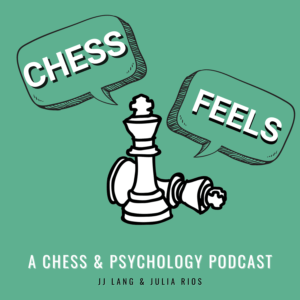
About the podcast
Just like many others on this list, The Chess Feels is a relative newcomer on the chess podcasting scene, with the first episode launched on the 15th of March, 2022. It is hosted by two personalities very well known in the sphere of chess Twitter – Julia Rios, a professional therapist who describes herself as an „amateur checkmate finder“ and J.J. Lang, a professional chess teacher who describes himself as an „amateur feelings haver“.
Even though it is a relatively young podcast on the scene, Chess Feels Podcast immediately distinguished itself with its unique blend of chess and psychology. As its name suggests, the Chess Feels Podcast is a chess podcast that has a very heavy focus on feelings, emotions, and our psychological relationship with the game. Its official description states that the podcast explores:
„Social and psychological aspects of the game we all love… and hate.“
My impressions of the podcast
As someone who always had a keen interest in (popular) psychology, who used to run their own (popular) psychology blog, and who experiences a lot of emotional and psychological issues related to chess, I was very curious when I heard about the podcast launching. I have always felt chess culture is somewhat similar to the self-help culture in terms of obsession with self-improvement and success and that there was definitely some room for an honest discussion about the negative effects of such an obsession on our emotional well-being.
In my view, the Chess Feels podcast fills this gap perfectly. Even though, at the moment of writing 27 they have „only“ released 17th episodes, they already managed to talk about a number of extremely important, yet somewhat taboo, topics such as addiction to blitz, setting reasonable chess goals and quitting in chess. It is very refreshing to hear someone talk about these deep psychological topics so openly and I really like the combination of Julia’s expertise as a therapist and JJ’s vulnerability when it comes to expressing his own experience related to these, somewhat highly sensitive topics.
As someone who has struggled with all the above-mentioned issues, I found a number of episodes extremely relatable. I often have this underlying feeling that the hosts have spent some time inside my head/my living room, observed my behavior, and decided to talk about it on air. For me, it is very comforting to know I am not the only one struggling with certain psychological difficulties and that some of my issues are much more universal than you originally think. 28
What I particularly like about the podcast is not only the fact that the hosts talk about these psychological topics, but also HOW they talk about them and WHAT kind of conclusions they make. I really like the mature, anti-self-help philosophy that is in sharp contrast to the usual messaging prevalent in the chess circles. 29
In a world obsessed with ratings, chess improvement, and success, it is refreshing to hear that there are numerous ways to try and enjoy the game, that choosing not to improve and try to have fun is okay and not a „loser mentality“, that quitting in order to have more time for more fulfilling endeavors is permitted, that the rating system introduces a lot of problems with identification and the perception of self-worth and that, in general, everybody in the chess world should try to exercise more compassion and empathy.
Both toward other people.
And themselves.
Now, from everything I have written above you might have gotten the impression that ChessFeels is a very gloomy, serious, and emotional podcast where both the hosts and listeners are on the verge of tears from the beginning until the very end.
Alas, nothing could be further from the truth. The hosts’ ability to talk about a very serious topic while maintaining a very light-hearted, self-deprecating tone is precisely one of the amazing features of the Chess Feels podcast. Almost every episode is full of humouristic titbits, ranging from cringe dad jokes, cliches, chess stereotypes, observations about the chess culture, and internal jokes sometimes very alien to the outsiders. Hell, even when they are making an ad for a sponsor,30 the hosts can keep a straight face and do it with the help of irony and sarcasm.
It is sufficient to listen to just one episode of the podcast (or check the hosts’ personal Twitter accounts) to understand that neither of them takes themselves very seriously.
It is precisely this unique blend of serious conversations and juvenile, sometimes grotesque, and absurd humour that makes the Chess Feels podcast such a unique, entertaining, and worthwhile listening experience and I would definitely urge you to give it a try, even if you don’t fully like the „funnier“ side of it.
The conversations and the topics covered in it are far too important to be ignored!
Notable episodes of the podcast
To be completely honest, every episode of the Chess Feels Podcast is worthy of a listen in its own way. But if I had to single out a few of the episodes released so far, I would definitely recommend:
- Season 1, episode nr. 2 which dives very deep into the topic of (online) blitz addiction
- Season 1, episode nr.10 in which the pair talks about chess goals, whether they are useful at all and how to go about setting more reasonable and realistic goals that have a positive effect on one’s motivation and love for the game.
- Season 2, episode nr.1 in which hosts used Levy Rozman’s announcement to quit competitive chess as a starting point for an in-depth discussion about what it actually means to quit in chess, when an individual could/should start considering it and how to develop a more healthy attitude toward the game.
- Season 1, episode nr.8, featuring the guest NM Gopal Menon, which is titled „What your opening repertoire tells about your sex life“. This episode is definitely a bit outlandish and „weird“ – but a good type of weird. It highlights Julia and J.J.’s non-serious side and how their sense of humour can sometimes border with absurdity – and NM Gopal Menon 31 fit in perfectly with his own dry and sarcastic sense of humour.
The Chess Underground Podcast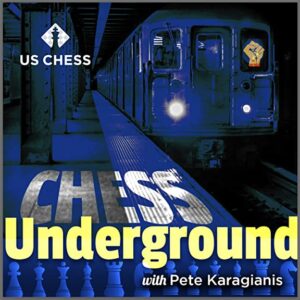
About the podcast
The Chess Underground Podcast is one of the four monthly (!) Chess Podcasts officially hosted by US Chess – the official chess federation of the United States of America. The show is hosted by NM Pete Karagianis, the US Chess Assistant Director of Events, and was first launched in November 2020. It is devoted to a wide variety of different chess topics – ongoing chess news, discussion of chess events, discussion of chess trends such as the rise of chess streaming during the pandemic, etc.
But the show also covers some unconventional topics, such as „Online Chess All-Nighters“ or „What is Chess Most Like“. This unconventional side is also foreshadowed by the official show description that states that The Chess Underground Podcast „explores eccentricities, peculiarities, and theoretical novelties“.
And it was precisely this unconventional, peculiar and eccentric side of the podcast that attracted me immediately to it and turned me into a regular listener.
My impressions of the podcast
Even though the Chess Undeground Podcast was launched way back in 2020, I wasn’t fully aware of its existence 32 until the following Twitter exchange that happened on 19th April 2022:

(For more INCREDIBLY FUNNY INSIGHTS AND COMMENTS LIKE THE ONE ABOVE, PLEASE FOLLOW ME ON TWITTER)
After receiving a reply from the US Chess official account, I realized that US Chess hosts no less than four (!) monthly podcasts. I immediately gave them all a listen and tried adding them to my regular podcast listening schedule. Yet, out of the four, The Chess Undeground was somehow the one that attracted me the most.
Why is that so?
For me personally, the „quirky“ vibe of the podcasts and the interesting topics that are being discussed make it somewhat unique and different compared to the other chess podcasts out there. I personally find in-depth discussions about the intricacies of the chess variants, the history of the online chess degeneracy, or who would win in a hypothetical chess match between Shrek and Andre the Giant extremely interesting and entertaining.
Of course, if it was all silliness and quirkiness, the podcast would have quickly become too absurd. This is why it is important to mention that the podcast is not ALL about these strange and unconventional topics. Thus, you will also have the opportunity to hear entertaining chess stories and discussions about chess books, chess tournaments, and chess players.
In my opinion – just like the Chess Feels Podcast -the Chess Underground has managed to find just the right balance between serious and non-serious, which makes it very insightful and at the same time entertaining.
I think all the credit for this general „vibe“ of the podcast should go to the host, Peter Karagianis. Peter strikes me as an extremely intelligent and informed person with an enormous, genuine passion for the game, while at the same time also as someone with a great sense of humour and who doesn’t take himself too seriously.
I also thoroughly enjoy the fact that his co-host in the majority of episodes since I started listening to the podcast was NM Gopal Menon – the same Gopal featured heavily in the aforementioned legendary episode nr.8 of the Chess Feels Podcast. Gopal is another extremely funny, yet extremely strong and knowledgable chess player. I think his dry, sarcastic and self-deprecating style perfectly complements Peter’s a bit less absurd, but no less relaxed personality and I find the dynamic between the two absolutely hilarious.
I genuinely hope Gopal will continue to be a regular on the show. But even if he doesn’t, I can wholeheartedly recommend the Chess Underground Podcast to everyone.
Notable episodes of the podcast
As mentioned earlier, since I found out about The Chess Undeground relatively late in the day, I naturally started by listening to some of the newer episodes – and three of them, in particular, left an indelible impression:
- Episode 37 titled „What Is Chess Most Like“, is particularly noteworthy for Gopal Menon’s passionate hate for overly used comparisons to chess in popular and sports culture.
- Episode 40, which provides a very insightful and thoughtful discussion on performing at one’s best and what contributes to the feeling of „flow“ in a chess tournament.
- Episode 41, in which the topic is Online Chess All-nighters. It also attempts to answer the million-dollar question: „Would Gopal know how to adjust the ICC client Blitzin settings even today?“
With that being said, I did go back in time to check some of the older episodes, and I really liked:
- Episode nr. 2 featuring a discussion with Micah Tuhy – a representative of the endangered species – chess historians. As someone who interacted with Micah a bit back in my Quora days, it was very interesting to hear him talk and share his infinite passion for the game in podcast form.
- Episode nr. 28 featuring WFM Devina Devagharan. Even though I am not too big of an aficionado of the Twitch culture, streaming, and Twitch personalities, I did listen to this one with great interest. It was very interesting to hear about the challenges of Twitch Stream from a „smaller“ streamer 33, and I also admire Devina for her firm stand related to mental health.
Chess Podcasts I Regularly Listen To
The four podcasts mentioned above are definitely the ones I listen to most regularly (to the point of not missing a single episode and literally dropping anything else as soon as I realize a new episode is released).
However, there are also quite a few other chess podcasts that I love listening to, although, for various reasons, with greater or lesser frequency.
Besides, it would be unjust if an article devoted to Best Chess Podcasts mentioned only four chess podcasts. This is why, without further ado, I present you with a list of Chess Podcasts I Regularly Listen To.
64: A Chess Podcast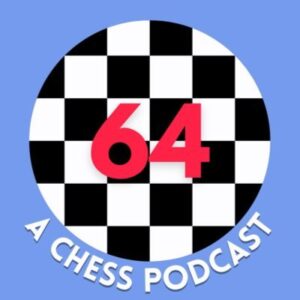
About the podcast
64: A Chess Podcast is another relative newcomer on the scene of the chess podcasting spawned in the aftermath of the Great Chess 2019/2020 Boom. 64: It is hosted by David Vizgan, an Astronomy P.H.D Student during the day and an avid chess enthusiast and aficionado during the night. David got interested in chess back in 2017, after watching Hikaru Nakamura streams. Since 2018, he started taking chess more seriously, taking private lessons, and immersing himself more and more in chess history and chess culture.
Starting a chess podcast a few years later, therefore, seemed like a natural step. It was launched in March 2021, when the first episode featuring FM James Canty 34 was released.
I will let David explain himself how 64: A Ches Podcast came to be:
„I had a basketball podcast with my brother and some friends back at the start of the pandemic and wondered what a chess podcast might be like. I gave a listen to Perpetual Chess and Ladies Knight and got a sense of what the scene was like.
Basically realized I could use a podcast as an excuse to talk to interesting people in the chess world and pick their brain. So the first episodes of the podcast were basically me just asking people I liked in the chess world a bunch of questions about their careers, and also the questions I wanted answered about chess culture/improvement/history/whatever.“
Very soon after the launch, the podcast started getting some traction, inevitable sponsorship by Chessable followed and, as they say, the rest is history.
My impressions of the podcast
Even though I was vaguely familiar with the 64: A Chess Podcast in the past, it wasn’t until May 2022 and the episode with my former co-worker, Twitter celebrity Mr. Dodgy, until I actually decided to give it a listen. And even though that particular episode was… well… exactly what you expect from an episode featuring Mr. Dodgy, I soon started paying more attention to the podcast and listening to it more and more regularly.
The first thing I liked is the podcast’s emphasis on the history and cultural impact of the game, rather than say, chess improvement. In one of my later conversations with David, I realized it is not by chance, but rather by design. By his own admission:
„I try to avoid the chess improvement stuff these days as quite frankly everyone seems to be on that wave, and i am not nearly as passionate about that as others. I mostly want to dive deeper into chess culture and history with my podcast, and interview the people who have helped move the culture and history of our game forward.“
The second thing that really appealed to me is David’s immersion in the game. For someone who has been involved in the chess world for a relatively short period of time AND who has been pursuing a Ph.D. career „on the side“, David is extremely knowledgable about different aspects of our game. Whether it is top-level chess events, chess history, chess books, chess trivia, or chess on Twitch, David has it covered. His interest in the game shines through in every episode – and its combination with his genuine and pure love for the game makes the podcast very enjoyable to listen to.
Another thing I really like about David is his general personality. First of all, he does have a somewhat distinguished, peculiar, and dry, sense of humour. It does take some time to get used to. Very often, guests are somewhat struck dumbfounded when confronted with it. 35 But when you do „catch it“, it does grow on you and you start appreciating it more and more from one episode to another.
However, even more importantly, what I really like about David is his authenticity. He does strike me as a very genuine person who is willing to speak their mind freely and openly, which is something I value very highly in a person.
This trait is reflected not only in his tendency to ask his – sometimes very illustrious guests – some tough and touchy questions (as for example in the very notable episode featuring Peter Svidler), but also in his willingness to express himself freely on other channels.
Even though I don’t always agree with his writing/viewpoint, as someone who has a lot of experience in being (overly) zealous and outspoken on Twitter, I value it when someone is not afraid to put themselves out there and stand for what they think is important. Especially if they are a (chess) podcast host.
Therefore, if you combine everything written above with the fact that a number of well-known personalities from the chess world such as Anish Giri, Peter Svidler, Maurice Ashley, Benjamin Bok – and yes, Mr. Dodgy have already appeared on the show, you can understand why I can definitely recommend you to add 64: A Chess Podcast in the rotation of podcasts you regularly listen to, as well!
Why don’t I listen to it more regularly?
To be completely honest, as I was writing my, extremely favourable, impressions of the podcast, I asked myself the same question. Why exactly do I not listen to 64: A Chess Podcast more regularly?
After some consideration, I was unable to come up with a clear-cut answer, but I think the gist of it can be boiled down to the fact that David is not a full-time podcaster so it is sometimes hard to keep track of what is going on in the 64: A Chess Podcast world. This is reflected in the following:
- Messy Release Schedule – I am sure David will agree with me that the release schedule is a bit of a mess. Sometimes he doesn’t release an episode in several weeks and sometimes he releases two episodes in two days. Such a schedule makes it difficult for the listener to know when a new episode is going to be released and to plan the time required to actually listen to it.
- No official channels for communication with the listeners and sharing important information about the podcast – Whereas some other podcasts such as The Perpetual Chess Podcast have a website and mailing list to which you can subscribe in order to find out vital information about the podcast in advance, this is not the case for 64: A Chess Podcast. I think this is a serious drawback in particular for a podcast based on the Host-Guest format. I find it very difficult to find out who will be the next guest on the podcast, whether there is a possibility of submitting questions to the guest, and so on – and I think it would benefit the podcast tremendously if these things were enabled and made more convenient for the listener.
- General structure/flow of episodes – I am not sure if I am the right person to give this advice given that I have no experience in being a podcast host, but when I compare 64: A Chess Podcast with, say, Perpetual Chess Podcast, I do sometimes notice a difference in the flow of the conversation and the difference in the type of the questions that are being asked. I am not sure if this is due to the fact that Ben has been doing this for longer than anyone else, the fact he is doing it on a more professional level and better prepared, or purely my subjective impression, but I would personally love to see a bit more structured and a tad more professional approach in 64: A Chess Podcast, as well. I feel it would be possible to make some small alterations without losing the unique and authentic vibe of the show.
Notable episodes of the podcast
Just like with Perpetual Chess Podcast, it is a bit difficult to select a few notable episodes without omitting some other, equally memorable ones. However, if someone pointed out a gun to my head, I would probably mention the following three:
- The memorable episode with GM Peter Svidler in which David managed to elicit a very emotional and memorable speech about his own attitude toward the Russian invasion of Ukraine. David himself mentioned that this is how he envisions an ideal episode of the podcast to look like.
- This episode with the CEO of Chessable and my former boss Geert Van Der Velde, features a very honest conversation about the advantages and potential disadvantages of Chessable and memorizing openings. I may be subjective, but I highly liked that one.
- This episode with GM Peter Heine Nielsen in which we managed to see Magnus’ coach and one of the hosts of the Chicken Chess Podcast in a somewhat more laidback, different light, despite the fact the episode was filmed at the height of the FIDE Presidential campaign.
Cover Stories with Chess Life by US Chess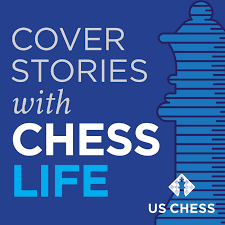
About the podcast
Cover Stories With Chess Life is one of the four podcasts hosted by US Chess, the official chess federation of the United States. It is a monthly podcast hosted by John Hartmann, the editor of the official magazine of the federation Chess Life, in which he invites the author of the cover story of the latest issue of the magazine to discuss the article itself, but also things from other areas of chess.
And life.
My impressions of the podcast
Even though I was familiar with John Hartmann due to his appearances on the Perpetual Chess Podcast and his extremely meticulous, detailed, and rigorous book reviews posted on his website chessbookreviews.wordpress.org, I never actually had the opportunity to interact with him 36 until April 2022, when I decided to quit my job at Chessable and pursue the career of chess freelancer.
Just around that time, I got into contact with John in regard to writing a report on the Grand Prix Series for the June edition of Chess Life. He very graciously provided me with the opportunity to write an article and – against my wildest expectations – ended up turning it into a Cover Story and inviting me as a guest on the episode of the Cover Stories with Chess Life podcast.
Throughout my work on the article and our conversation on the podcast, I got to learn that John is not only an extremely dedicated, meticulous, and hard-working editor, but also a much warmer and gentler person than it sometimes seems from his online writing and activity. The reason why his writing/book reviews can sometimes come across as harsh is the combination of his genuine care when it comes to the quality of the chess content and his genuine concern related to certain negative trends in the world of chess publishing, or even the chess industry as a whole.
Why is all this relevant? Because John’s warmth, extreme knowledge of the chess world, meticulousness, and attention to detail that make him such a good book reviewer and editor, his boundless love for the game and his very high sense of morality and ethics are all very much reflected in every single episode of Cover Stories with Chess Life.
For example, I was very impressed by the level of preparation and amount of research John did for my own appearance. He not only went over my chess writing but even dug up my dormant pop-psychology blog. Furthermore, his genuine curiosity – both with the recorder turned off and on – made me feel very valued and comfortable throughout the episode. He definitely gave me more than enough spotlight, while he also didn’t hesitate to include his own voice and ask some relatively uncomfortable questions related to my work at Chessable and my opinion of the platform and its publishing trends.
From what I have heard, this combination of extreme preparation, enthusiasm, curiosity, and John’s own voice is present in every other episode in the podcast and it usually leads to very interesting and engaging conversations, almost irrespective of who the guest is.
Of course, that is not to say that the guest list of the Cover Stories with Chess Life podcast is unimpressive. As you would expect from a high-profile magazine, very often the cover story is written by prominent names of the chess world that then also appear on the podcast. Thus, you will find names of top players such as Maxime Vachier-Lagrave, Sam Shankland, renowned coaches such as Jacob Aagard or John Donaldson, or well-known grandmasters such as Elshan Moradiabadi or Alexander Lenderman on the list of guests that appeared on the show.
On the other hand, given that John often provides lesser-known personalities 37 to write a cover story, the guest list is also very diverse and features very interesting guests you don’t have the opportunity to listen to every day, such as Adisa Banjoko, the founder of the Hip Hop Chess Federation or Caroline King, sister of FM Alex King and photographer who shot the cover photo of the July edition of the Chess Life Magazine.
Why don’t I listen to it more regularly?
As I was writing the lines above, I once again asked myself the same question. Here are some of my thoughts on the matter:
- First of all, the more podcast reviews I write, the more I realize I have an inclination toward podcasts with a standard cast of hosts and prefer them to hosts that feature a different guest in every other episode.
- Secondly, what I wrote about the 64: A Chess Podcast when we talk about knowing the guests in advance definitely applies to Cover Stories with Chess Life. The guests of the podcast are usually not announced publicly in advance – which is understandable given that it is not always known in advance who will be the author of the Cover Story, but it makes it a bit more difficult to get excited about the episode ahead of time.
- Thirdly, the Chess Life magazine and, consequently, Cover Stories with Chess Life podcast do have an American-centered angle when it comes to the coverage and discussion of chess events in the world. It is very natural for a publication/podcast officially backed up by US Chess and there is nothing inherently wrong with that, of course. But given the abundance of other chess podcasts out there,
So long story short, Cover Stories with Chess Life is a great podcast hosted by a very well-prepared, enthusiastic, and curious host. I would particularly recommend it to the US audience and people subscribed to Chess Life Magazine, although it definitely has something to offer for everyone!
Notable episodes of the podcast
- I would lie if I didn’t say I was really excited and thrilled to have the opportunity to write an article for Chess Life and be featured as a guest in a podcast episode. It may be a small step for the chess world, but it was certainly a giant leap for my own attempt to make it as a chess freelancer and I am very thankful to John for the opportunity.
- I found episode number 41 with GM Maxime Vachier-Lagrave very interesting, as it was filmed directly after his successful performance in the World Rapid and Blitz Championship held at the end of 2021, so it was a very unique opportunity to hear a very fresh impression from a top-player and a newly crowned World Blitz Champion.
- I really liked episode number 44 with GM Elshan Moradiabadi. I got to interact briefly with Elshan during my Chessable days and he immediately strike me as a very modest and authentic person and as someone who genuinely loves chess and cares for his students as a coach.
- Last but not least, I really liked episode number 33 with Adisa Banjoko, simply because he is not your average chess guest and because I found his impressions of the chess world and his relationship with the game fascinating and entertaining.
The Late Knight Show Podcast 
About the podcast
The Late Knight Show Podcast is another podcast that appeared relatively late on the scene of chess podcasting, with the first episode being released on 19th February 2022. It is a podcast hosted by the Norwegian sports commentator Askild Bryn and Grandmaster David Howell and officially backed up/managed by chess24.com and Meltwater Chess Tour.
It features conversations with top players participating in the tour such as Anish Giri or Jordeen van Foreest and other people associated with chess24/Meltwater Chess Tour, such as the official commentators of the tour Jovanka Houska or Simon Williams.
My impressions of the podcast
Even though I was semi-aware of the existence of the Late Knight Show podcast since its conception, I first listened to it only after I did my research for the first iteration of this article.
Immediately from the very first episode, I have had sort of mixed feelings about it. On one hand, given that I am a big fan of GM David Howell and his personality, I was very eager to hear him in a long audio format.
Furthermore, since The Late Knight Show can be considered the „official podcast of the Meltwater Champions Chess Tour“, it is not surprising that the hosts/producers were able to invite top players and well-known personalities from the get-go – a luxury not many new podcasts on the scene are able to afford. I won’t deny that seeing the likes of Anish Giri or Eric Hansen on the guest list immediately attracted me – especially if we take my aforementioned affinity toward David Howell as a host into account.
And sure enough, the episodes of the podcast provided me with exactly what I expected – interesting and informed conversations that provide the listener with an insight into the mind of a top chess player or a commentator. I also really liked the light-hearted, relaxed vibe of the podcast, although at times it does come across as a bit forced.
This actually allows me to jump back to my earlier statement and segway into the part of the article where I start to explain why exactly I had mixed feelings from the get-go.
Why don’t I listen to it more regularly?
As mentioned above, the very first problem I have with the podcast is how forced attempts to be relaxed and humouristic sometimes come across. When I compare the flow and humour of The Late Knight Show to, say, Chicken Chess Club or Chess Feels Podcast, it seems much less organic and genuine.
For example, every episode starts with a segment where the hosts ask the guests a series of „rapid fire“ questions. This segment is obviously intended to be a relaxing and light-hearted intro to the podcast, but it feels extremely forced and it quickly becomes repetitive.
Even though Askild and David seem like very nice people with great personalities, their lack of experience when it comes to hosting a podcast is apparent – and I feel forcing these kinds of segments doesn’t help.
This, to an extent, exacerbates the main problem I have with the Late Knight Show. You see, in many regards, it suffers from the same problems as, say, 64: A Chess Podcast – it looks extremely amateurish. It is true that the podcast does have some sort of official website, but one brief look at it makes it obvious that the amount of information leaves a lot to be desired:
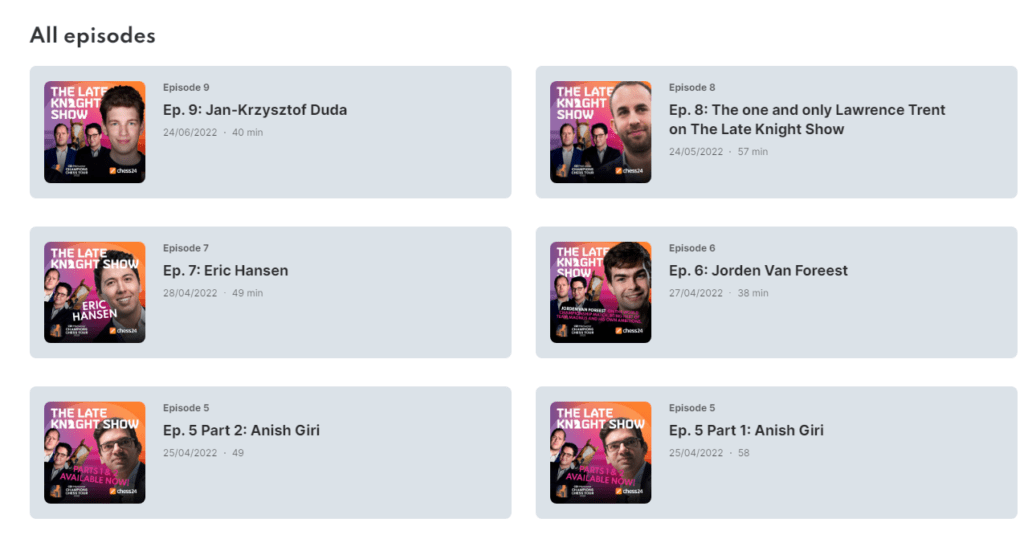
(The official website only shows episodes 5-9 and I haven’t found a way to scroll and find episodes 1-4)
From the photo above it is also obvious that the publishing schedule of the podcast is a mess. You don’t have to be a math genius or expert statistician to realize that release of the episodes on the 25th, 27th, 28th of April, 24th of May, and then 24th of June doesn’t really follow any particular pattern. Not to mention that new episodes haven’t been published ever since and to me it is very unclear whether the podcast will be back for a new season of the Champions Chess Tour or not.
Whereas this lack of professional presentation and scheduling is understandable when we are talking about 64: A Chess Podcast, which is essentially a one-man show, it is absolutely shocking when it comes to a podcast that is officially backed by very big entities that are a part of the PlayMagnus group.
You get the feeling the whole idea sprung to life as a result of a sudden decision to scrape up something real-quick because Podcasts are now „in“, without a deep and thorough strategizing and thinking about how best to go about the execution of that very idea.
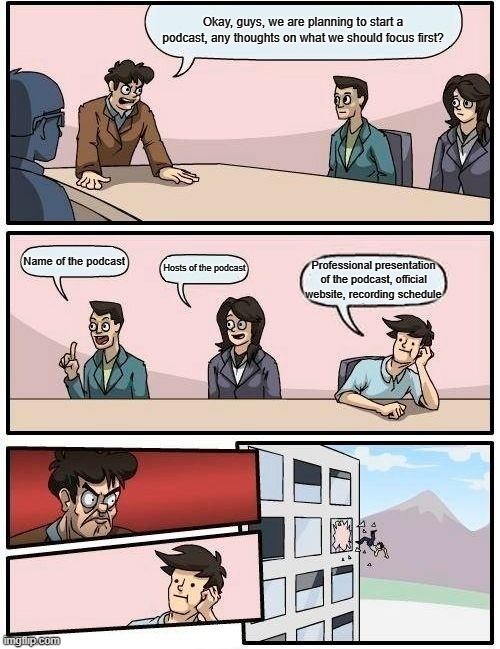
So long story short, even though it is true that The Late Knight Show provides us with another opportunity to hear the thoughts of top players and well-known personalities from the chess world. However, in this day and age – so do many other podcasts. The episodes themselves are quite enjoyable and the podcast does have a lot of potential, but I do feel that the lack of strategy and professionalism is hurting it, both when it comes to improving the quality of each individual episode even further and in terms of its overall presentation.
I will personally continue listening to it occasionally if new episodes ever get released, but I will not consider it the end of the world if the entire project gets shut down after all.
Notable episodes of the podcast
Given that, at the moment of writing, only 9 episodes of the podcast have been released, it was a bit tricky to single out any of them. However, the two episodes that were noteworthy for me are:
- Episode number 7 with GM Eric Hansen. Even though Eric, as a founder of the popular streaming collective „Chessbrah“ is a well-known chess personality, this was the first time I heard him speak openly about the time when he stayed in Europe to play chess and how it negatively affected his mental health and his overall well-being.
- Episode number 5, featuring GM Anish Giri. In general, I am a big fan of Anish and have listened to several of his appearances in different podcasts, but I singled this one out because Anish openly discussed some heated topics such as the hack of his Twitter account and the controversy related to his second Jorden van Foreest becoming a part of Magnus Carlsen’s World Championship Team.
The Chess Experience Podcast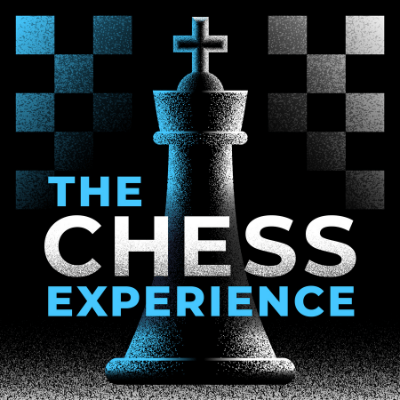
About the podcast
The Chess Experience Podcast is another podcast that came to life as a consequence of the Great Chess Boom. It is hosted by Daniel Lona, an avid chess player, and enthusiast who returned to chess after getting inspired by the Queen’s Gambit after 27-year-long hiatus.
The first few episodes were launched in February 2022 and ever since the podcast has been going on on a weekly basis. The main emphasis of the podcast is chess improvement. Throughout the episodes, Daniel and his guests try to help adult improvers make their journey more efficient and find the right balance between spending time on something useful and spending time on something fun.
My impressions of the podcast
Just like with the Late Knight Podcast 38 my feelings related to the Chess Experience Podcast are very mixed and I have a certain love-hate relationship with it.
Let’s start with the good stuff. Daniel is definitely radiating enthusiasm and passion for the game. According to his admission, after returning to chess he spent 4 hours a day studying and playing chess. You simply can’t spend that much time on an activity if you are not in love – or borderline obsessed – with it. This enthusiasm is apparent not only in his tweets but also in the way he interacts with his guests. Sometimes you can hear his excitement already when he is announcing the episode and this positive energy definitely makes the episodes enjoyable to listen to.
Furthermore, nobody can deny that Daniel is a very hard-working and capable individual who is taking podcasting very seriously. In contrast to some other podcasts mentioned on this list (including The Late Knight Podcast), his podcast has a very professional-looking website, he is always announcing guests well in advance and providing the listeners the opportunity to ask questions and is also running regular giveaways after the episode is released.
Last but not least, what personally attracted me to the podcast were the guests featured in different episodes. Despite not being immersed in the chess world for too long and is relatively new on the chess podcasting scene, almost from the get-go Daniel has managed to assemble a very respectable guest list consisting of some very well-known chess personalities. In the very first few episodes, he managed to get well-known coaches and Chessable authors like Yuriy Krykun and Andras Toth and it was also quite interesting to hear the legendary Dan Heisman in a podcast episode.
I personally got hooked around episode 12, featuring James Altucher, and I also very much enjoyed the episode with the legendary WGM Jen Shahade. As a matter of fact, another fact I like about Daniel’s guest list is the prevalence of female guests. By his own admission, he tries to keep the ratio between male and female guests at least 50-50 and I think it is a very admirable goal 39
Therefore, this combination of Daniel’s enthusiasm and passion for the game and a lineup of extremely interesting guests makes The Chess Experience a podcast that is worth putting on your radar.
Why don’t I listen to it more regularly?
So, why have I exactly written I have mixed feelings and a love-hate relationship with The Chess Experience?
Glad you asked. There are several reasons why I don’t really listen to The Chess Experience more often:
- First of all, given podcast is primarily aimed at adult improvers – which usually refers to someone on a lower rating level than mine – I don’t think I am its primary target audience. Especially since I am more interested in chess culture, chess history, or chess personalities rather than chess improvement tips.
- Secondly, I do sometimes feel that Daniel’s lack of longevity in the chess world and relatively short experience as a chess host podcaster sometimes leads to episodes being a bit one-dimensional. Sometimes I do feel that the questions are a bit too unnuanced and generic compared to the questions asked in some other chess podcasts.
I have the feeling several episodes stick to the same „Round of generic questions + round of chess improvement advice + round of Daniel admiring the guest and telling them they are sure to achieve their goals“ formula, which sometimes makes the listening experience repetitive. - Thirdly, there are moments when I really find myself highly disagreeing with the general vibe of the podcast, which does incorporate a very positive philosophy and at times, borderline self-helpish, messaging. This was especially pronounced in the episode featuring FM James Canty III, where the „Gotta Stay Positive“ message was very pronounced. Given that I regard the „Always Stay Positive“ attitude as not only a hoax but also very harmful and that I fully agree with the blogger Mark Manson that The Secret is one of the worst books ever written, it should not come as a surprise that this particular episode was the only ever episode of a chess podcast I actually stopped listening midway through. And even though this episode was extreme and this kind of messaging is usually negligible enough to be ignored and even though a more balanced attitude toward chess improvement – in the style of Chess Feels Podcast – is occasionally promoted, 40 I still find myself bothered by this aspect of the podcast, so I thought I should mention it here.
- Last – and most importantly – the thing that bothers me the most about The Chess Experience Podcast is its business aspect. From the very beginning, it was obvious that Daniel launched the podcast with the idea of making money out of it. This is not that surprising given Daniel’s entrepreneurial spirit and the fact he ventured into similar endeavors in the past. At some point, he even hosted a podcast with a heavy emphasis on earning money titled The 7 Figure Fitness Business whose official description, among other things, stated:
„My message won’t resonate unless you strive to deliver world-class service, help as many folks as possible, and earn an outstanding income as your reward.“
The fact that The Chess Experience is a business is also very apparent from the very title of the home website of the podcast – AdultChessAcademy.com and from a very marketing-oriented copywriting-sounding prose found everywhere on the website. Besides, Daniel himself doesn’t hide it given that he states he „… launched this business/podcast in early 2022.“ on the home page – and he also confirmed it in our private conversation after I reached out to him to ask him a few questions about the podcast/business.
Now, I know most of you might be wondering – what is wrong with an entrepreneurial spirit, launching a business, and trying to earn some money? Isn’t it fair to get compensated for your enormous work as a content creator? Don’t many other podcasts do the same or strive to do the same?
Those are indeed some legitimate questions! I definitely don’t want to say no business should exist and that no one should try to make money in the chess world. 41 But I do believe there are businesses and there are businesses and that there are different ways one can go about making money.
In the context of chess podcasts,42 it does matter to me under which pretext the podcast launched, how exactly the monetization works, what kind of product/service the host of the podcast offers, and what kind of messaging surrounds that product/service.
In my book, The Chess Experience doesn’t score particularly well in either of these categories. First of all – as mentioned above, it is hard to avoid the feeling that the primary motivation for the launch of The Chess Experience was to eventually turn it into a business. This is in sharp contrast with a podcast such as The Perpetual Chess Podcast 43 that was 44 founded primarily because the host wanted to discuss chess with someone. Only later, after organic growth, did it become more business-oriented – or at least this business side wasn’t so pronounced from the very start.
In other words, whereas for some other podcasts enthusiasm and passion came first and business only later, in the case of The Chess Experience at best they came hand in hand – and at worst business came first and passion and enthusiasm later. That is not to say that Daniel’s enthusiasm is fake by any means, but I do often get the feeling he is over-emphasizing it on social media to the point of it not coming off as fully authentic. Maybe it is just my innate cynicism, but I find it hard to believe that someone can constantly be so excited by the game, so inspired by all the chess personalities in the world and so positive toward everybody else in the chess world.
Secondly, I also really dislike how the monetization of The Chess Experience is arranged. Just a couple of days ago, on September 20th, Daniel announced the launch of his online membership program titled Chess Improver Monthly.
I highly dislike that this membership program incorporates filming separately filmed content with EXISTING guests of the podcast and placing it behind the paywall. Such a way of monetizing a podcast that intentionally makes the part of the recorded material unavailable to a broad audience is in sharp contrast with the general messaging about growing the game and helping adult improvers improve.
I don’t know how standard this business model is in the podcasting world, but I very much prefer the model of Perpetual Chess Podcast which is primarily based on audience support via Patreon. It is true that even Ben Johnson’s model includes additional, exclusive audio content in the form of old Coffee and Chess shows with Fred Wilson 45, but Ben’s own interviews with the guests were always available in their entirety.As for the other aspects of Chess Improver Monthly – I am probably not the most suitable person to judge their allure given that I am not really the target audience. But superficially, I find it a bit hard to understand how exactly are they different or advantageous compared to other similar products – and even free resources – available out there.
In my mind, there is a difference between starting a business because you have an idea for a product that might solve certain problems and starting a business because you recognize that there is a market for A product. Chess Improver Monthly does reinforce my feeling that Daniel has decided that the chess niche is a market for a product without previously knowing what that product might actually be.
But then again, quite a few people have already joined the program and have found its perks beneficial, so what do I really know?
In any case, The Chess Experience podcast is definitely a good and professional podcast with a wide and interesting list of guests. If you are an adult improver interested in the topic of improvement and are not as anti-business/socialist as the author of these lines, you should definitely check it out!
I will personally continue listening to it as long as the things I dislike about its business aspect don’t become too problematic for me to handle.
Notable episodes of the podcast
- As mentioned above, I started listening to The Chess Experience podcast around episode 12, featuring James Altucher. Given that I have read a number of his books and written an article titled 16 things I learned from James Altucher in the past, every appearance of his on a chess podcast is of extreme interest to me, so this one was basically a no-brainer for me.
- Episode nr. 14 with Jen Shahade was also very interesting and inspiring. Even though I have had the opportunity to hear Jen in several other podcast appearances, in this one she shared a lot of interesting and inspiring titbits about chess and improvement that are definitely worth hearing.
- Episode nr. 19 with the legendary Indonesian IM Irene Sukandar. Even though Irene is a very well-known personality in the chess world, I haven’t heard a long-form interview of her before. It was extremely interesting to hear her perspective on the status of chess in Indonesia. And also her perspective of the majorly publicized Dewa Kipas incident.
- Episode nr. 28 with the legendary Bruce Pandolfini. Prior to this interview, I have mostly known him by his name and by some of his legendary accomplishments but had never bothered to learn more beyond that. Listening to this episode was a nice attempt to rectify this hole in my chess knowledge.
The Gotham City Podcast
About the podcast
The Gotham City Podcast is a podcast hosted by the International Chess Master from New York, Levy Rozman. If by any chance you don’t know anything about Levy 46, he is the owner of the biggest Youtube chess channel 47 called Gotham Chess and arguably one of the biggest chess celebrities on the Internet.
The Gotham City Podcast, officially launched in August 2021, features Levy hosting different – often very well-known – chess, poker, and Twitch – personalities and engaging in conversations about everything related to chess, but also topics from the other areas of life.
My impressions of the podcast
First of all, let’s not fool ourselves – anyone who is capable of achieving the level of success Levy has achieved in the last few years has to be a very intelligent, capable, and hard-working individual.
Furthermore, everyone who has ever watched any of Levy’s videos knows what kind of energetic, overly dramatic, and entertaining persona he takes up when presenting content on the Internet.
Last but not least, anyone who has ever read some of his tweets or listened to his streams/commentary knows he is sometimes very opinionated – and not afraid to express this opinion publicly and openly.
Why am I mentioning this pseudo-psychological couch analysis? Because I have a feeling all of these character traits become even more apparent in The Gotham City Podcast and in a conversation with his guests.
Almost every episode I listened to is a combination of very deep, profound, and insightful conversation, humouristic and less humouristic stories and anecdotes, somewhat silly jokes, and Levy’s opinions. For example, in the episode nr. 17 featuring John Bartholomew, in a short span of the first 30 minutes Levy talks with John about how his involvement with Chessable came to be, profoundly and openly expresses his opinion about Chessable and its usefulness for 2000+ players and shares a story about how some young player has blitzed his preparation up to move 40. All this makes the podcast very fast-paced, interesting to listen to, and entertaining.
Of course, that is not to say that all the credit goes to Levy as a host. Due to his success as a content creator and his involvement with chess.com, from the get-go, Levy has – similarly to the hosts of The Late Knight Show Podcast – had access to big names in the chess world – and not only chess world – that your average podcaster simply doesn’t have. I mean, how many chess podcaster can get Anish Giri as a guest in the very first episode they launch? Or get Dommaraju Gukesh to join the show immediately after his impressive performance in the Chennai Olympiad 2022?
This combination of very interesting and high-profile guests together and Levy’s vibrant and entertaining personality is what definitely makes this podcast worth checking out.
Why don’t I listen to it more regularly?
Now, as usual, you might be wondering „Wow Vjeko, you just had so many nice things to say about the Podcast, why don’t you listen to it more regularly?“
As usual, it is a very good question. Here is my reasoning:
- First of all, everything I wrote earlier about, say 64: A Chess Podcast is kinda valid here. Gotham City Podcast’s schedule is very irregular 48, there is no official website or way to find out who the future guests will be and I also think Levy’s interviewing skills are inferior to, say, Ben Johnson’s interviewing skills – which is not that surprising given that hosting a podcast is quite different to recording a youtube video and for Levy – The Gotham City Podcast is definitely a side gig, not the main focus.
- Secondly, the Gotham City Podcast was launched at the height of the chess boom, at the moment when chess was exploding on Twitch and when several chess streamers were starting to make it big. It is not surprising that the first few episodes featured several well-known online personalities such as Samay Raina, NortherLion, QTCinderella, and Michelle Khare. Since I personally never had too much of an interest in a competition like Pogchamps nor its participants 49 I didn’t get into the habit of listening to The Gotham City Podcast in the early days and went on to listen to other podcasts launched around the similar time, instead.
- Furthermore, since a number of guests that appeared on The Gotham City Podcast are quite famous, I already had the opportunity to hear some of them (Anish Giri, Anna Rudolf, Eric Rosen, Kostya Kavutskiy) on other podcasts/channels. In contrast to, say, The Perpetual Chess Podcast, Cover Stories With Chess Life, 64: A Chess Podcast, and The Chess Experience Podcast, Levy’s guest list is a bit more uniform and lacking in variety.
- Even though I said that Levy’s energy and personality are what makes the podcast fast-paced and entertaining, I realized there is a limit to how much of the „fast-paced “ and „entertainment“ I can intake. I experienced a very similar problem with The Gotham City Podcast as with the majority of Levy’s content – I can consume it for a while but inevitably I get fed up/bored and have to switch to something else. Whether it is due to the fact my complaints are objective, due to the fact I am not necessarily Levy’s target audience, or the fact I am not necessarily his biggest fan, I will not dare to venture.
So long story short, The Gotham City Podcast is a podcast worth checking out, especially if you are a big fan of Levy’s regular content – but also if you are not. I personally will continue listening to it occasionally and checking the episodes every now and then, but I highly doubt I will become a regular listener.
Notable episodes of the podcast
- By far my favorite episode of The Gotham City Podcast is the aforementioned episode number 26 featuring Dommaraju Gukesh, a young Indian superstar. The interview provided us with a unique glimpse into a mind of a chess prodigy, directly after his stellar performance at the 2022 Chess Olympiad.
- I also really liked episode number 11 with Anna Cramling, mainly because of the very insightful and open conversation about the problem of sexism in chess and Anna’s own negative experience(s).
- Another episode I personally found interesting was episode number 15 with the Swedish nr.1 GM Nils Grandelius. Nils is a very strong player 50 but also an extremely nice, humble, and passionate individual, with an enormous love for the game. He usually doesn’t get that much publicity, so it was really nice to have the opportunity to learn more about him and his perspective on chess.
Chess Podcasts I Wish I Had Time To Listen To
Last but not least, there are some chess podcasts that definitely deserve to be mentioned, but that I, unfortunately, haven’t yet gotten around to listening to much (at all). In no particular order:
One Move At A Time Podcast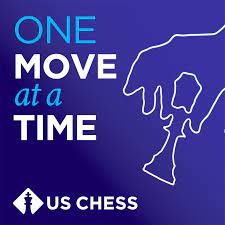
One Move At A Time Podcast is one of the four podcasts hosted by the United States Chess Federation. It is hosted by the Senior Director of Strategic Communication Dan Lucas and according to the official description in the podcast, Lucas
„talks to people who are advancing the US Chess mission statement to “Empower people, enrich lives, and enhance communities through chess.”
Even though the abundance of the chess podcasts is definitely the reason number one why I didn’t listen to a single episode of this particular podcast 51, by skimming through the list of guests it seems to me that this one is a bit more „US-centric“ than some other podcasts on this list – which is not shocking given its description.
Still, I definitely noticed some very interesting guests, such as IM Greg Shahade 52, Fred and Bonnie Waitzkin 53 and Young-Kyu Yoo 54, so I sincerely hope I will manage to find some time and listen to it in some point in the future.
Ladies Knight Podcast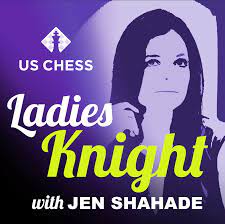
Ladies Knight is the final of the four podcasts hosted by the United States Chess Federation. It is hosted by the well-known chess player, poker player, chess author, and very outspoken feminist, WGM Jennifer Shahade – who nowadays works as the Woman’s Program Director at US Chess.
It shouldn’t come as a surprise, then, that the Ladies Knight podcast is devoted to celebrating female chess. The guest list consists of notable female chess players such as Irene Sukandar, Carissa Yip, or Irina Krush, renowned authors such as Maria Konnikova, and other female chess coaches, artists, activists, and ambassadors!
Now that I write the lines above, I really wonder why I never bothered to listen to any of the episodes so far. Partly it is the saturation of the offer available on the Chess Podcasting market these days, but it is surely also partly due to the male bias that is ever-so-present in the chess world.
A bias worth noticing and changing, so I definitely hope I will make a habit of listening to the Ladies Knight Podcast and learning more about fascinating women of the chess world in the future! 55
The Chess Pit Podcast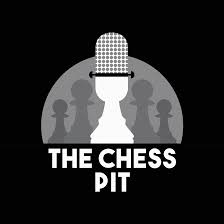
The Chess Pit Podcast is one of the O.G. chess podcasts in the sense that it was one of the very first chess podcasts after Perpetual Chess Podcast that saw the light of the day. It is hosted by three chess enthusiasts from Britain – Jon Mackenzie, Phil Makepeace, and Robin Sarfas – and is described as a
„Weekly podcast where three guys talk about chess…occasionally“.
Even though The Chess Pit Podcast was started in the middle of the pandemic back in 2020 – when there weren’t as many chess podcasts as there are today – it still somehow eluded my attention. I only got more aware of it recently after the trio appeared in an episode of 64: A Chess Podcast and after Jon Mackenzie – who seems to have a big background in football and sports reporting, and not only chess – appeared on an episode of ChessFeels Podcast.
To be completely honest, after listening to these two episodes I kinda regretted not listening to Chess Pit more often as I found both of these very entertaining and hilarious. Boys from The Chess Pit Podcast don’t take themselves – nor chess or chess improvement – too seriously and bring a dash of typical cynical British humour to the chess scene.
So I definitely hope I will find some time to give their podcast a listen in the future, too.
Chess Journeys: Tales of Adult Improvement Podcast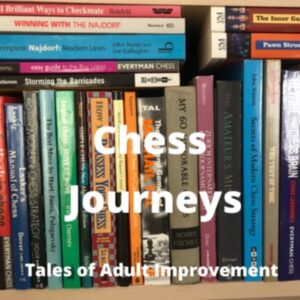
Chess Journeys: Tales of Adult Improvement is a chess podcast hosted by Dr. Kevin Scull, the proud owner of a Ph.D. in history who describes himself as a „Lifetime learner“ and „Obsessed with chess improvement“. As its title suggests, the podcast’s focus is primarily on adult improvement. The majority of the guests are known or lesser-known adult improvers and proud members of the „chesspunk“ community, who talk about their own journey and methods they use to elevate their game.
However, every now and then, a stronger player/and or experienced coach is invited to the podcast to share his/her wisdom and we have seen some household names such as IM Andras Toth, IM Kostya Kavutskiy, WGM Tatev Abrahamyan, and WGM Jennifer Shahade make an appearance.
Why have I never listened to this episode? Again, the offer is too big these days and a podcast dedicated to Adult Improvement is not the first one to listen to on my list of priorities. Still, I think it is cool to provide a platform for people who are night in the highest rating echelons to talk about their chess journey and improvement methods.
I know there is a large and growing community of adult improvers on Twitter – and not only on Twitter. So if you feel you belong in that category, make sure to check this podcast and the #chesspunks hashtag on Twitter!
Let’s Talk About Chess Podcast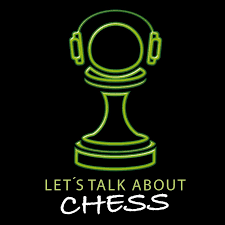
Let’s Talk About Chess Podcast is a podcast hosted by Dutch chess writer and photographer Eric van Reem. According to the podcast description:
„In this podcast, Eric talks with various interesting personalities from the chess world about their lives and careers, but he also keeps an eye on the current situation in the chess world.“
I will be honest – I learned about this podcast only when doing some research for the needs of this article. It is also a bit unclear whether it is an active podcast, given that the last episode was published on 29th April, 2021. Still, since the list of guests includes names such as Ganguly Surya Shekhar, Peter Heine Nielsen, and none other than Viswanathan Anand, it is probably not an understatement to say that Let’s Talk About Chess Podcast definitely deserves some more attention/recognition.
Even though I haven’t yet had the opportunity to listen to a single episode, I do hope it will change in the future!
The C-Squared Podcast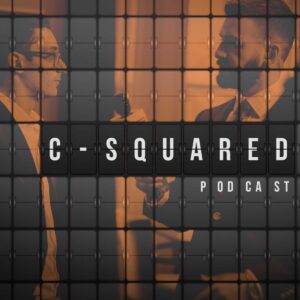
Last but, most definitely not least, on 9th September 2022 – many days after this article was originally outlined – the world of Chess Podcasting was hit by a bombshell. Former World Championship Challenger and one of the best players in the world, Grandmaster Fabiano Caruana announced the launch of his own podcast, titled The C-Squared Podcast.
At the moment of writing 56 three episodes have been released, but given the saturation of the market of Chess Podcasts, I haven’t yet been able to give a listen to the single one. However, given that Fabiano has been a joy to listen to in any of his other media appearances and the fact he has been one of the top players in the world for more than a decade, I do hope I will find some time to give this one a listen in the future.
At the very least, I thought it should be mentioned on this list!
Conclusion
Phew… This finally brings us to the conclusion of this long article devoted to chess podcasts. I would like to thank you, dear reader, for bearing with me until the very end. I hope the list presented above has provided you with a better overview of the chess podcasting niche and that it will help you select your own favourite chess podcast.
Of course, as mentioned earlier, I don’t claim this list is exhaustive by any means. I am sure there are probably some chess podcasts I failed to mention that are very deserving of appearing on this list.
Also, given how quickly new chess podcasts appear on the horizon, I am pretty sure this list will very quickly become somewhat outdated!
If YOU are thinking about starting a podcast, dear reader, and would like to be featured on this list….
…
….
…
…
….
….
…
…
can you please not do it?
Aren’t there enough chess podcasts to listen to out there?
Do we really need one to include in our busy chess podcast listening schedule?
Pleaaaaaaaase?
- As the following Reddit thread from that era vividly demonstrates
- TM
- I am writing these lines on 16th September 2022 – just 7 days after Fabiano Caruana launched his own chess podcast, titled C-Squared Podcast
- As a matter of fact, Chessable sponsors so many podcasts that I often meme with people who wish to remain anonymous that nowadays everyone has a chess podcast and they are all sponsored by Chessable
- Please dear hosts, I know you all read the same articles that recommend Tuesday as the best day to publish a podcast, but can we get a better distribution throughout the week :D
- Read: Impossible
- and not just a chess podcast
- given that most podcasts are available in audio-only format, although recently we have seen more and more podcasts also being available in the video format
- If we are talking about a podcast that does feature the host-guest dynamic – which is true for the majority of the podcasts out there
- or radio
- Unless you are a chess960/chess variant cultist
- or any podcast, for that matter.
- as quite a few do
- as well as the list of podcasts, for that matter
- Nor do I really want to do so or pretend I have done so completely
- Apart from maybe the C-Squared podcast, which was launched very recently
- apart from the fact that many of them can’t really drive
- Or stalk via Twitter
- This is one of my favourite character traits – and a very rare one for a chess player, especially of GM level
- although all true fans of the Podcast know that cynical humour and mutual mockery are the Podcasts’ best part.
- I am writing this lines on 16th of September
- From the purely „technical“ perspective
- Yeah yeah, I know, I am a chess elitist
- No homo
- or rating
- Although some people have complained about this variety in the past – most notably about the fact that Ben seemingly invites a lot of American authors/educators/personalities. While there might be some truth to this, I do want to point out that there isn’t a podcast in the world where EVERY guest will be equally interesting to everybody. I think that the pluses of having a diverse guestlist nevertheless outweigh the minuses
- 20th September 2022
- And I am apparently, not the only one. One of my chess students told me listening to this podcast helped him alleviate his anxiety before playing long classical chess games.
- and even some other podcasts
- Oh, have I mentioned the podcast is sponsored by Chessable? Shocking, I know!
- Who will be mentioned very soon in the context of another podcast
- and the existence of other podcasts hosted by US Chess
- relatively speaking
- Who was still an NM at a time
- Which is very often hilarious in itself
- if you don’t count a brief email exchange when I worked at Chessable
- Like myself
- Or even more so
- Which also makes me feel less bad for not listening to Ladies Knight as of yet
- as in one of the recent episodes where Daniel mentioned that you should ask yourself „Why“ you want to improve before asking „How“ to improve
- as otherwise, I would complain about this aspect in my review of other podcasts, as well
- and not only chess podcasts
- or even Chess Feels Podcast or 64: A Chess Podcast
- were
- That are no longer available since Ben and Fred had a limited-time deal
- In which case, I have to ask – have you been living under a rock or something?
- at the moment of writing
- At some point, there was a three-month hiatus from one episode to another
- as fits any self-respectable chess elitist
- understatement of the year?
- or any podcast from the final part of this list, for that matter
- well-known chess personality, founder of the US Chess/Pro Chess League and sworn nemesis of IM Lawrence Trent
- Fred was the main protagonist of the famous movie Searching for Bobby Fischer and is nowadays a highly accomplished martial artist
- the father of the chess prodigy Christopher Yoo
- Although it has to be said I do so through other podcasts, as it is not like I intentionally skip any episode featuring a female guest.
- 20th September 2022

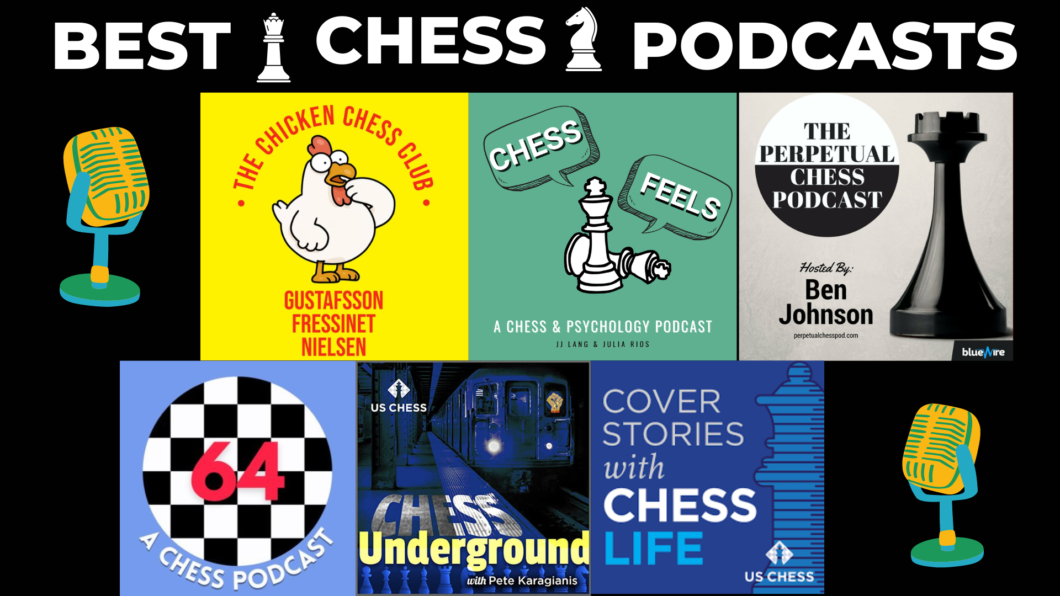
I’m a bit surprised at how terrible the Chicken Chess Club podcast is. Too bad, because I usually enjoy Jan Gustafsson’s insights in other formats. But here, the three hosts have zero chemistry and don’t even seem to like each other (strange, since they worked extensively together, and at close quarters, for Magnus). They are constantly either interrupting each other or leaving empty air. They don’t stay on topic and seem not to have read their own episode outlines — especially Peter Heine Nielsen, who often seems not to be listening at all. Nielsen in particular is tiresome and repetitive, especially his tirades against FIDE — where I usually agree with him, by the way! Bad production values, too — background noise, lousy mics, no volume equalization. Just a hot mess all around.